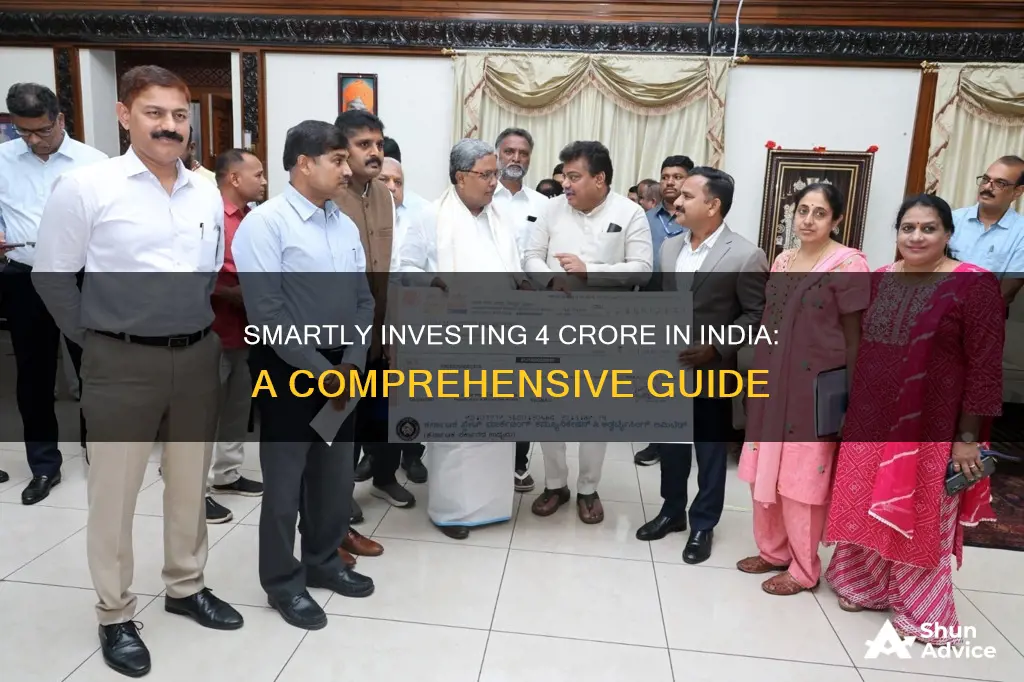
If you're looking to invest 4 crore rupees in India, there are several options to consider. It's important to define your financial goals and risk tolerance before deciding on an investment strategy. Here are some popular investment avenues in India:
- Debt Mutual Funds: These funds offer systematic withdrawal plans (SWPs) that provide a steady income stream. SWPs help investors avoid the risks of timing the market and offer benefits such as liquidity and professional fund management.
- Fixed Deposits (FDs): FDs are known for their safety and are a popular choice for generating monthly income. They offer fixed interest rates, various tenure options, capital preservation, and predictable returns.
- Peer-to-Peer (P2P) Lending: This emerging investment option connects borrowers directly with individual lenders, bypassing traditional financial institutions. Investors can earn monthly returns by lending to creditworthy borrowers, often with higher returns than traditional fixed-income options.
- Post Office Monthly Income Scheme (POMIS): POMIS is a government-backed scheme that offers assured monthly income with low risk. It has a low investment limit, currently offering a decent interest rate of 7.40% per year.
- Real Estate: Investing in physical properties or real estate investment trusts (REITs) can provide rental income and potential capital appreciation over time. Real estate also serves as a hedge against inflation.
- Balanced Advantage Funds and Multi-Asset Funds: These hybrid funds typically offer a mix of equity, debt, and gold, yielding long-term average returns of 10-12%. They are suitable for investors with a medium risk appetite.
- Equity Mutual Funds: For those seeking higher returns, investing in equity mutual funds through Systematic Investment Plans (SIPs) can be a good option. SIPs in large-cap funds can potentially generate returns of around 12%.
| Characteristics | Values |
|---|---|
| Investment Options | Debt Mutual Funds, Fixed Deposits, Peer-to-Peer Lending, Post Office Monthly Income Scheme, Real Estate, Rental Income, REITs, Balanced Advantage Funds, Dynamic Asset Allocation Funds, Equity Mutual Funds, Systematic Investment Plan, Large-Cap Funds, Sovereign Gold Bonds, US Stocks, National Pension Scheme, Public Provident Fund, Debt Funds, Flexi Cap Funds, Multi-Cap Funds, Term Insurance, Health Insurance, Emergency Fund |
| Investment Horizon | Short-term (7 days) to long-term (10 years) |
| Risk Profile | Low, Medium, High |
| Return Profile | 7-12% |
| Inflation Rate | 6-8% |
| Taxation | 20% long-term capital gains tax, 30% base tax, 25% surcharge, 4% cess |
| Investment Amount | INR 4 Crore |
What You'll Learn

Systematic Investment Plan (SIP) in large-cap funds
Systematic Investment Plans (SIPs) are a popular investment tool in India that allows individuals to invest a fixed amount regularly in mutual funds. This approach offers several benefits, including disciplined savings, dollar-cost averaging, and the potential for long-term wealth accumulation.
SIPs are particularly attractive for investors with 4 crore rupees to invest because they allow for a gradual investment strategy that reduces the impact of market volatility. By investing a set amount at regular intervals, investors can take advantage of market fluctuations and potentially generate higher returns over time. This strategy is known as "rupee cost averaging" or "dollar-cost averaging".
- Rupee Cost Averaging: This strategy helps investors benefit from market fluctuations. During market downturns, your fixed investment buys more mutual fund units, and during upswings, it buys fewer units. This approach mitigates the impact of market volatility over time.
- Disciplined and Consistent Investing: SIP promotes financial discipline by allowing investors to commit to regular contributions regardless of market conditions. This disciplined approach encourages consistency in investing, fostering a habit of regular savings and wealth creation.
- Flexibility in Investment Amount: SIPs offer flexibility in terms of investment amounts and frequency. Investors can adjust their contribution amount or frequency according to their financial situation and goals. This adaptability ensures that their investment strategy can evolve with their changing circumstances, providing a personalized approach to wealth management.
- Professional Fund Management: SIP investments are managed by professional fund managers who make informed investment decisions based on market conditions and the fund's objectives. This professional management aims to optimize returns and effectively manage risks, providing investors with the expertise needed for successful mutual fund investments.
- Long-term Wealth Creation: SIP is designed for long-term wealth creation. Through consistent and disciplined contributions, coupled with the power of compounding, investors can achieve significant returns over an extended period. This long-term approach aligns well with financial goals such as retirement planning or building a corpus for major life events.
- Option to Temporarily Halt Investments: SIP provides the convenience of temporarily suspending investments, which is especially valuable during financial challenges. The SIP automatically resumes at the end of the pause period.
- Unrestricted Investment Ceiling: With a minimum SIP investment of Rs. 100 and no strict upper limit, investors can contribute any amount they choose through the SIP. Ensuring the ongoing consistency of SIP investments throughout the plan's duration is essential for optimal results.
- Diversification: Through SIPs, investors benefit from diversification across various asset classes and sectors. By investing regularly, your investments are spread over different market conditions, reducing the risk associated with market volatility.
- Passively Managed Funds: SIPs can also include passively managed funds, such as index funds or ETFs, which track specific market indices and aim to replicate their performance. These funds often have lower fees and can provide broad market exposure, making them a cost-effective option.
When considering investing 4 crore rupees in India through SIPs, it is important to remember that SIPs are a long-term investment strategy. Therefore, it is advisable to invest with a reference point of at least five years to gauge fund performance across different market conditions, aligning with your long-term investment goals. Additionally, it is crucial to assess your financial goals, risk tolerance, the performance of the mutual funds, investment horizon, and fund management fees before making any investment decisions.
Savings Strategies: Best Investments to Grow Your Money
You may want to see also

Fixed Deposits (FDs)
FDs offer a guaranteed return: One of the biggest advantages of investing in FDs is the guaranteed returns. When you invest in an FD, you will know exactly how much money you will make over the tenure. This predictability makes it easier to plan your finances and future investments. The interest rates offered by banks and NBFCs vary, so it is essential to compare rates before investing. Generally, NBFCs offer slightly higher interest rates than banks, but it is always advisable to check the credibility and safety ratings of the NBFC before investing.
The tenure of FDs can vary: Fixed deposits in India usually offer a range of tenure options, typically starting from 7 days and going up to 10 years. For a substantial amount like 4 crore rupees, you have the flexibility to choose a tenure that aligns with your financial goals. You can opt for short-term FDs that offer liquidity and quick returns or go for long-term FDs that provide the benefit of compound interest, resulting in higher overall returns. It is essential to assess your financial needs and choose tenures that match your goals, whether saving for a future expense or creating a stable source of income through regular interest payouts.
Tax implications: When investing such a substantial amount, it is crucial to consider the tax implications. In India, interest income from FDs is added to your total income and taxed according to your income tax slab. However, if the interest income exceeds Rs. 40,000 in a financial year, the bank will deduct Tax Deducted at Source (TDS) while crediting the interest to your account. To avoid TDS, you can submit Form 15G/15H to the bank, declaring that your total income is below the taxable limit. Nonetheless, even if TDS is deducted, you can claim a refund while filing your income tax return.
Safety and security of your investment: FDs are considered one of the safest investment options in India. Banks and established NBFCs follow stringent regulatory guidelines, ensuring the safety of your investment. The deposit insurance provided by the Deposit Insurance and Credit Guarantee Corporation (DICGC) covers FDs in banks up to Rs. 5,00,000 per depositor per bank. NBFCs, on the other hand, may not offer the same level of deposit insurance, so it is essential to assess their financial health and credit ratings before investing. Diversifying your FDs across multiple institutions can also enhance the safety of your investment.
To conclude, investing 4 crore rupees in Fixed Deposits (FDs) in India can be a prudent choice if you seek stable and guaranteed returns. FDs offer flexibility in terms of tenure, providing you with the option to choose short-term or long-term investments. While the interest rates may vary across banks and NBFCs, you can maximize your returns by comparing rates and choosing credible financial institutions. Remember to consider the tax implications and ensure you understand the safety and security measures provided by the chosen bank or NBFC. With proper planning and assessment, FDs can be a secure and rewarding option for investing your substantial sum of money.
U.S. Investment Management: Advising or Managing Your Money?
You may want to see also

Real estate investment trusts (REITs)
REITs are a good option for those who want to invest in real estate without having to buy, manage, or finance properties themselves. They are also suitable for those with a substantial amount of capital to invest. In India, the concept of REITs is relatively new, with the first guidelines introduced by the Securities Exchange Board of India (SEBI) in 2007.
- Structure: REITs have a three-tier structure, including a Sponsor, a Trustee, and a Manager. The Sponsor is typically a real estate company that sets up the REIT and transfers the properties to the trust. The Trustee holds the assets on behalf of the unitholders, while the Manager is responsible for managing the assets and making investment decisions.
- Eligibility Criteria: To be classified as a REIT in India, a company must be a trust formed under the Indian Trust Act 1882 and registered under the SEBI REITs Regulations. It must invest at least 80% of its capital in income-generating properties, with a maximum of 10% in under-construction properties. Additionally, it must have an asset base of at least Rs. 500 crore and declare its Net Asset Value (NAV) twice a year.
- Types of REITs: There are different types of REITs available, including Equity REITs, Mortgage REITs, and Hybrid REITs. Equity REITs are the most common type, investing in income-producing properties. Mortgage REITs lend money to real estate companies and earn income through interest payments. Hybrid REITs offer a combination of both equity and mortgage REITs, providing diversification across debt and equity.
- Benefits of Investing in REITs: REITs offer investors the opportunity to diversify their investment portfolios by exposing them to the real estate sector. They also provide a small initial investment option, professional management of assets, regular income through rental yields, and potential capital gains.
- Limitations of Investing in REITs: Currently, there are only a few REIT options in India, limiting investor choices. REITs also have low liquidity, and any dividend or interest earned is taxable according to the investor's slab rate.
- Taxation Rules: Dividends and interest earned from REITs are taxable according to the investor's slab rate. Capital gains from the sale of REIT units are subject to Short Term Capital Gains (STCG) and Long Term Capital Gains (LTCG) taxes, similar to equity investments.
- How to Invest: The best way to invest in REITs is to purchase units on the stock market, as they are listed and traded on stock exchanges. A Demat account is mandatory for investing in REITs in India.
Rajiv Gandhi Equity Savings Scheme: A Smart Investment Move
You may want to see also

Senior Citizen's Savings Scheme
The Senior Citizen Savings Scheme (SCSS) is a government-backed retirement benefits programme for senior citizens resident in India. The scheme offers a regular stream of income with the highest safety and tax-saving benefits. It is a Post Office savings scheme, with a maximum deposit of Rs 30 lakhs. The scheme features a fixed 8.2% interest rate, which is payable quarterly. The maturity period is 5 years, however, this can be extended for 3 years by submitting an application.
The following individuals can open an SCSS account:
- Those above 60 years of age
- Retired civilian employees above 55 years and below 60 years, providing the investment is made within 1 month of receiving retirement benefits
- Retired defence employees above 50 years and below 60 years, providing the investment is made within 1 month of receiving retirement benefits
Non-Resident Indians (NRIs) and Hindu Undivided Families (HUFs) are not eligible to open an SCSS account.
The minimum deposit is Rs 1,000 and the maximum is Rs 30 lakh. The deposits can be made in multiples of Rs 1,000. Individuals can open more than one SCSS account, either by themselves or with a joint account with their spouse. The account can be transferred from a post office to a bank and vice versa.
The SCSS account can be opened at a bank or post office. The application form must be submitted with Know Your Customer (KYC) documents and a cheque for the amount being deposited. Nominees can be added to the account.
The scheme offers tax benefits under Section 80C of the Indian Tax Act, 1961. Individuals are eligible for tax deductions on investments up to Rs 1.5 lakh. If the interest generated is more than Rs 10,000 per annum, the tax will be deducted at source.
Global Investment Management Firms: Their Role and Impact
You may want to see also

Debt Mutual Funds
Liquid debt funds are a great option for parking your emergency funds, as they offer better returns than a savings bank account without taking on too much risk. Debt funds are also a good choice for investors seeking regular income, such as retired persons. They are ideal for conservative or first-time mutual fund investors who want to avoid the risk of investing in equity funds.
- Aditya Birla Sun Life Medium Term Plan Direct Growth: This fund has provided annualised returns of 14.42% in the past three years and 10.55% in the last five years. The minimum amount required to invest via lump sum is ₹1,000 and via SIP is ₹1,000.
- Aditya Birla Sun Life Medium Term Direct Plan Growth: This fund has delivered annualised returns of 13.26% in the past three years and 8.91% in the last five years. The minimum amount to invest via lump sum is ₹1,000 and via SIP is ₹1,000.
- HDFC Regular Savings Fund Direct Growth: With annualised returns of 8.88% in the past three years and 8.94% in the last five years, this fund has a minimum investment amount of ₹5,000 via lump sum and ₹300 via SIP.
- ICICI Prudential Dynamic Bond Direct Plan Growth: This fund has generated annualised returns of 8.63% in the past three years and 8.38% in the last five years. The minimum amount required to invest is ₹5,000 via lump sum and ₹1,000 via SIP.
- UTI Medium to Long Duration Fund Direct Growth: The UTI Medium to Long Duration Fund has offered annualised returns of 8.27% in the past three years and 7.43% in the last five years. The minimum investment amount is ₹500 for both lump sum and SIP.
- Aditya Birla Sun Life Dynamic Bond Retail Fund Direct Growth: This fund has given annualised returns of 7.71% in the past three years and 6.79% in the last five years. The minimum investment amount is ₹1,000 for both lump sum and SIP.
When investing in debt mutual funds, it is important to consider factors such as taxes, investment tenure, liquidity, and the credit quality rating of the underlying debt instruments. While debt funds carry less risk than equity funds, they are not completely risk-free. Interest rate risk and credit risk are two key risks associated with debt funds. It is also important to evaluate fund parameters carefully and ensure that your risk-return expectations are aligned with the fund's investment objective.
Venture Capitalists: Choosing and Managing Their Investments
You may want to see also
Frequently asked questions
There are several options for investing 4 crore rupees in India, including debt mutual funds, fixed deposits, peer-to-peer lending, post office monthly income schemes, and real estate.
Debt mutual funds offer systematic withdrawal plans (SWPs) that allow investors to create a steady income stream by regularly withdrawing a fixed amount from their investments. They also provide a diversified portfolio of debt securities, professional fund management, liquidity, and flexibility.
Fixed deposits (FDs) are a popular choice for creating a monthly income due to their safety. They can be started with a lump sum amount in any bank or post office for a period ranging from 7 days to 10 years. Investors have the flexibility to choose the frequency of their interest payments, and FDs offer fixed interest rates, various tenure options, capital preservation, and predictable returns.
Peer-to-peer (P2P) lending is an emerging investment option that connects borrowers directly with individual lenders, bypassing traditional financial institutions. Investors can earn monthly returns by lending money to creditworthy borrowers, often with higher returns than traditional fixed-income options. However, there is a risk of borrower defaults.
POMIS is a government-backed scheme that offers a safe and assured monthly income with regular, predictable returns. The investment limit is 9 lakh rupees for an individual account and 15 lakh rupees for a joint account, with a current interest rate of 7.40% per year.







